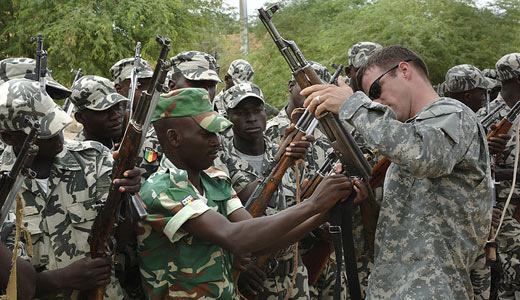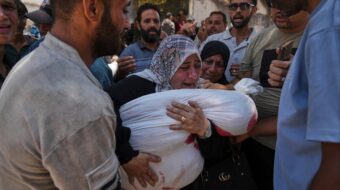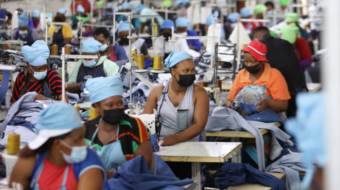
The political situation in the West African country of Mali (population 14.5 million) has taken a significant turn for the worse, with continued instability in the capital and major gains for groups wanting to break the country in half and create an Islamic state.
Such a state will possibly serve as a base of operations for al-Qaeda in Muslim Africa. The possibility that western nations, including the United States, might intervene with “boots on the ground” is getting stronger.
When Libyan strongman Muammar Gadaffi was overthrown last year by a combination of NATO forces and indigenous rebels, a large number of his fighters from the Tuareg ethnic group found themselves cut loose but in possession of vast amounts of armaments formerly belonging to the Libyan armed forces. They proceeded to invade the vast northeastern sector of Mali with the goal of establishing an independent Tuareg state, to be called Awazad. In this effort they made an alliance with Ansar Dine, Salafist Islamic forces with reputed links to al-Qaeda in the Islamic Maghreb (North Africa), which is also headed by a Tuareg, Iyad ag Ghaly. The combined rebel forces quickly overran a large area, sweeping aside Malian army units and killing many.
This led to uproar in Mali’s capital, Bamako, where the president, Amadou Toumani Touré, was accused of feckless irresponsibility for not providing enough support for his own troops in the northeast. On March 22, junior army officers, led by Captain Amadou Sanogo, overthrew Touré and established a military junta with the stated purpose of prosecuting the northern war more vigorously. But the army became even more disorganized as a result of the coup. Meanwhile Mali’s neighboring states, grouped as ECOWAS (Economic Community of West African States) used sanctions to try to reverse the coup and restore civilian government. The result was that the northern rebels swept forward, as Malian troops fled and local militias found themselves outgunned.
So the combined Tuareg MNLA (National Movement for the Liberation of Azawad) and Ansar Dine (Defenders of the Faith) forces quickly captured all major towns in northeastern Mali, including the historic city of Timbuktu, a UNESCO world heritage site because of its distinctive mosques and other buildings and its collection of ancient Arabic script manuscripts.
Reports from Timbuktu and other captured towns indicate that the Tuareg separatists would sweep through, defeat any defending forces, and be on their way, but the Ansar Dine forces would come to stay, providing economic help to the poor but also immediately implementing strict sharia law, which they hope to spread to all of Mali and beyond. This clashes sharply with West African Muslim customs, which are heavily suffused with Sufi influences distinct from the austere practices that Ansar Dine shares with al-Qaeda and the extremely conservative Wahabbi Islam of Saudi Arabia. Women must cover their faces, restrictions are placed on music, and, especially, the Sufi practice of venerating Muslim “saints” and praying at their tombs is declared blasphemous and illegal.
There are indications that local people are pushing back, but their conquerors are heavily armed.
The fighting in Mali has led to a massive refugee crisis, with hundreds of thousands of people fleeing to neighboring countries and aid agencies being unable to function.
The Tuareg separatists and Ansar Dine appear on the surface to have formed a mere alliance of convenience. The Tuareg leaders say they want to create a separate Tuareg republic, Azawad, and oppose strict sharia law. On the other hand, Ansar Dine originally did not want to break up Mali, but rather wanted to impose extreme sharia law on the whole country. But in May they came to an agreement to rule northeastern Mali together, and declared the national independence of Azawad.
Now the agreement appears to have fallen apart, the different goals of the two groups being an insuperable obstacle.
Meanwhile, in Bamako, after much international pressure, especially from ECOWAS, and an unsuccessful counter-coup, the military junta headed by Captain Sanogo agreed to step down (maybe – there are lots of conditions), and ex-President Touré agreed to step aside while new elections are prepared. An interim president, Dioncounda Traoré, who had been the speaker of the Malian parliament, was installed. But some supporters of the military junta were not happy with this and broke into Traoré’s office and beat him so severely that he lost consciousness and had to be flown to Paris for medical tests.
Under such circumstances, the idea that the Malian government, whoever it is, could rally its army and reverse the gains of the northern rebels is a non-starter. But almost all African political leaders are horrified at the precedent of countries on the continent breaking up along ethnic or religious lines. So all the neighboring countries have denounced the breakaway of the Malian northeast and promised to reverse it. Intervention by armies of neighboring African states seems highly likely.
The French government takes the attitude that as the former colonial power which retains a lot of economic control over Mali, it has a responsibility not to let things get out of hand. Algeria, to the north, is particularly worried about having a radical Salafist state on its borders, as is Niger to Mali’s east. Both these countries have significant Tuareg minorities.
A repeat of last year’s intervention in Libya is not impossible.
Photo: U.S. soldiers in Mali in 2007. U.S. Army // CC 2.0










